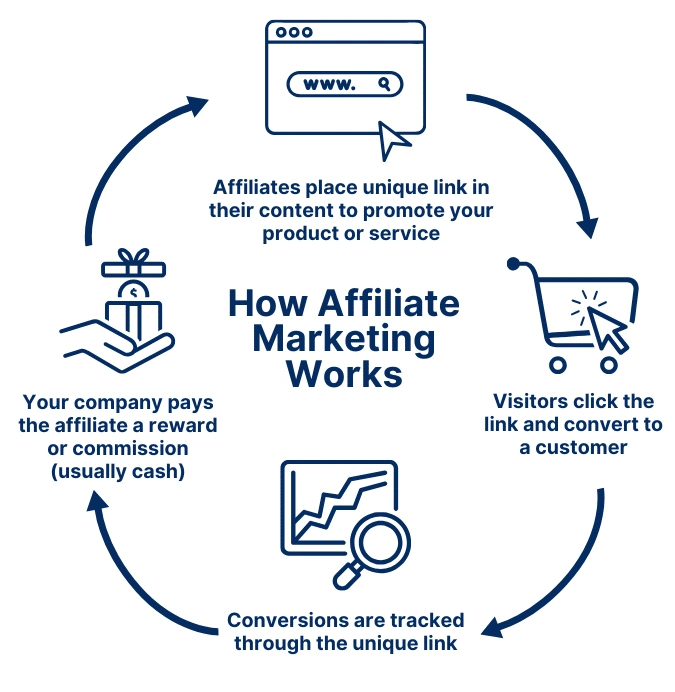Freelancing vs. Affiliate Marketing: Which One Is Better for Passive Income in 2025?

Freelancing and affiliate marketing both offer ways to make money online, but they work very differently.
Freelancing is simple—you trade your time and skills for money. Writers, designers, and developers get paid per project or hourly. The moment you stop working, the income stops too.
Affiliate marketing, on the other hand, is about promoting products and earning commissions on sales. You don’t need to create your own product, handle customers, or deal with shipping. Once your content ranks or your audience trusts your recommendations, sales can happen on autopilot. That’s where the passive income potential kicks in.
The big question is, which one is better for passive income? Freelancing gives quick cash, but it’s not truly passive.
Affiliate marketing takes longer to build, but it can generate income for years without constant effort. Let’s break it down and see which path makes the most sense for long-term financial freedom.
Key Takeaways: Freelancing vs. Affiliate Marketing
| Aspect | Freelancing | Affiliate Marketing |
|---|---|---|
| Income Type | Active—you trade time for money. | Passive—earn while you sleep. |
| Earnings Start | Immediate, once you land a client. | Delayed, takes time to build. |
| Scalability | Limited by your working hours. | Unlimited earning potential. |
| Upfront Work | Minimal, just find clients and work. | High, requires content creation. |
| Time Investment | Continuous—you must keep working. | Heavy upfront, less over time. |
| Risk Level | Low, since you get paid for work. | Higher, income depends on sales. |
| Skill Requirement | Service-based (writing, design, coding). | Marketing, SEO, content creation. |
| Best For | Quick cash, stable income. | Long-term passive income. |
What Is Freelancing?
Freelancing is working for yourself instead of a company. You sell your skills, take on projects, and get paid per task or contract. There’s no boss, no fixed salary—just you and your ability to find work. Some people freelance full-time, while others do it on the side for extra income.

Common freelance jobs include writing, graphic design, web development, video editing, and marketing. If a skill is in demand, chances are you can make money by offering it.
Many freelancers find work on platforms like Upwork, Fiverr, and Freelancer, while others build their own client base through networking and referrals.
Income varies. Some freelancers make a few hundred dollars a month, while others pull in six figures. It depends on skill level, experience, and the ability to market yourself. Payment methods also differ—some charge hourly rates, others take fixed fees per project.
Freelancing has its perks. You control your schedule, pick your clients, and set your rates. No office politics, no daily commute. But it’s not all easy. You must find your own work, manage deadlines, and deal with inconsistent income. Some months are great, others not so much.
Pros and Cons of Freelancing
| Pros | Cons |
|---|---|
| Quick way to start earning | Income depends on active work |
| No upfront investment needed | Hard to scale beyond a certain limit |
| Flexible work schedule | Clients can be unreliable |
| Choose your own projects | Constant need to find new gigs |
| Work from anywhere | No guaranteed income |
It’s a solid way to earn money, but it’s active income. You stop working, you stop earning. That’s why many freelancers eventually look for ways to generate passive income—like affiliate marketing.

If you have skills and want to start freelancing, I highly recommend Freelancer! It’s an easy way to find clients, get paid fast, and build a steady income.
What Is Affiliate Marketing?
Affiliate marketing is a way to earn money by promoting other people’s products. You don’t own the product. You just connect buyers to sellers and earn a commission when they make a purchase. It’s like being a middleman, but online.
Here’s how it works. You sign up for an affiliate program, get a unique tracking link, and share it. When someone clicks your link and buys, you get paid. Simple, right? But making it work takes strategy, consistency, and patience.

There are different ways to do affiliate marketing. Blogging is one of the most popular. Write helpful content, rank on Google, and let organic traffic bring in commissions.
YouTube works too. Create videos, recommend products, and drop affiliate links in the description. Email marketing is another solid method—build a list, send value-packed emails, and promote offers that match your audience’s needs.
The income potential is big, but it depends on your effort and strategy. Some affiliates make a few bucks a month. Others pull in six figures. You can earn one-time commissions or recurring revenue from memberships and subscriptions. Passive income is possible, but it takes time to build.
Recommended reading: How to Build Passive Income with Affiliate Marketing: A Step-by-Step Guide
Pros and Cons of Affiliate Marketing
| Pros | Cons |
|---|---|
| Low startup costs | Tough competition |
| No product creation | Results take time |
| Potential for passive income | Platforms can change rules overnight |
Affiliate marketing isn’t a get-rich-quick scheme. But if you pick the right niche, create valuable content, and stay consistent, it can be a serious income stream.
Key Differences Between Freelancing and Affiliate Marketing
Freelancing and affiliate marketing both offer ways to make money online, but they work differently and have distinct benefits and challenges. Here are the differences:
1. Income Model: One-Time Payments vs. Passive Commissions
Freelancing pays you for each project or task. Once the job is done, you get paid and move on to the next client. No ongoing earnings from past work.
Affiliate marketing, on the other hand, lets you earn commissions on content you created once. A blog post, YouTube video, or email campaign can keep making money for years. One effort, multiple payouts. That’s the power of passive income.
2. Time Investment: Trading Time for Money vs. Building Scalable Income
Freelancing is straightforward—you work, you get paid. No work, no money. It’s an active income model, meaning your earnings stop when you stop working.
Affiliate marketing requires upfront effort with no immediate return. But once your content ranks and converts, you can step back while commissions roll in. The more content you build, the less you rely on daily work to make money.
3. Scalability: Limited by Time vs. Unlimited Earning Potential
Freelancing has a ceiling. There are only so many hours in a day, and you can’t take on unlimited clients. You can raise your rates, but your income is still tied to your time.
Affiliate marketing isn’t limited by time. One piece of content can reach thousands of people. Add more content, and your earnings multiply. There’s no cap on how much you can make.
4. Skill Requirements: Service-Based Skills vs. Content Creation and Marketing
Freelancers need a skill they can sell—writing, design, programming, video editing. You get hired based on expertise and deliver work directly to clients.
Affiliate marketers focus on content creation, SEO, and digital marketing. You don’t need to sell a service; you need to attract and persuade an audience. It’s less about technical skills and more about strategy.
5. Upfront Effort: Immediate Earnings vs. Delayed Rewards
Freelancing brings fast money. Find a client, complete the job, get paid. If you need immediate income, it’s the safer choice.
Affiliate marketing takes patience. You put in work with no guarantee of success. But once your content starts ranking and converting, the income becomes passive. Instead of chasing clients, you get paid while you sleep.
Both models work, but if you want true passive income, affiliate marketing wins in the long run.
Which One Is Better for Passive Income?
Freelancing pays for your time. You work, you get paid. Simple. But the moment you stop working, the money stops too. It’s like a faucet—you have to keep turning it on to get water. Great for fast cash, but it’s not passive.
Affiliate marketing is different. You put in the work upfront—creating content, building an audience, ranking on Google. At first, it feels like pushing a boulder uphill. No instant payouts. But once things click, the money keeps coming even when you’re not actively working. That’s true passive income.
Let’s break it down…
A freelance writer gets paid per article. If they stop writing, the income stops. An affiliate marketer writes a single guide on “Best Web Hosting for Bloggers” and earns commissions from that post for years. Same effort, wildly different long-term results.
Which one is better depends on your goals. If you need quick cash, freelancing wins. But if you want to earn while you sleep, affiliate marketing is the better bet. Some people start with freelancing to pay the bills, then shift to affiliate marketing for passive income. Smart move.
Bottom line? Freelancing is a job. Affiliate marketing is a business. One pays now, the other pays later—but pays much more.
Can You Do Both?
Absolutely. Freelancing and affiliate marketing work well together. One brings in quick cash, the other builds passive income. If you balance them right, you can have the best of both worlds.
Freelancers Can Use Affiliate Marketing for Extra Income
Freelancing pays immediately, but it has limits. You trade time for money, and there are only so many hours in a day. That’s where affiliate marketing helps.
If you’re a freelance writer, you can add affiliate links to your blog or client work (when allowed). A web designer can recommend hosting services. A social media manager can create content around tools they already use.
It’s about getting paid twice—once for the service, again when someone buys through your link. Over time, those commissions add up. The best part? You don’t have to work extra hours to earn them.
Affiliate Marketers Can Use Freelancing to Fund Their Business
Affiliate marketing takes time to pay off. While you’re building traffic and growing your audience, freelancing covers the bills. Writing, design, or marketing gigs bring in steady cash while you test affiliate strategies.
I’ve seen people start as freelance writers, then turn their client work into blog posts that rank. Others use freelance income to run paid ads or invest in better tools. Instead of waiting months for affiliate earnings to kick in, freelancing gives you a safety net.
Finding the Right Balance
If freelancing takes all your time, affiliate marketing won’t grow. The trick is to set aside hours each week for your own content. Maybe you cut back on client work as your affiliate earnings grow.
Freelancing is great for short-term income. Affiliate marketing is better for long-term freedom. When combined, they create a strong, flexible income stream.
Conclusion: Which One Wins for Passive Income?
Freelancing and affiliate marketing both have their place. If you need money fast, freelancing is the way to go. You get paid for your skills, and the more you work, the more you earn. But there’s a limit. You only make money when you’re working.
Affiliate marketing takes longer to pay off, but once it does, the income can keep coming without extra effort. You put in the work upfront—creating content, building an audience, and promoting the right products. Over time, that effort can turn into steady, passive income.
If you want quick cash, start freelancing. If you want long-term, hands-off income, build an affiliate business. You can even do both—freelance to fund your affiliate marketing efforts until they take off.
Need help getting started with affiliate marketing? Contact us for a free consultation and learn how to build a real passive income stream.
Frequently Asked Questions
Which one makes money faster, freelancing or affiliate marketing?
Freelancing pays faster. You complete a job, send an invoice, and get paid. Affiliate marketing takes time. You have to build an audience, create content, and wait for commissions to grow. If you need quick cash, freelancing is better.
Which one offers better long-term passive income?
Affiliate marketing wins here. Once your content ranks and attracts traffic, commissions can keep coming in with little effort. Freelancing, on the other hand, requires constant work. No work, no pay.
Do I need special skills for freelancing or affiliate marketing?
Freelancing requires a marketable skill—writing, design, coding, or something businesses will pay for. Affiliate marketing needs content creation, SEO, and marketing skills. Both take effort, but affiliate marketing has a steeper learning curve in the beginning.
Can I do both freelancing and affiliate marketing?
Yes, and many people do. Freelancing pays the bills while you build your affiliate business. Once your affiliate income grows, you can reduce freelancing or quit entirely.
Which one has a higher earning potential?
Affiliate marketing has unlimited earning potential. Your content can generate income 24/7, even while you sleep. Freelancing is limited by your time—you can only take on so many projects. Long-term, affiliate marketing can scale much higher.




Your blog is a true hidden gem on the internet. Your thoughtful analysis and in-depth commentary set you apart from the crowd. Keep up the excellent work!